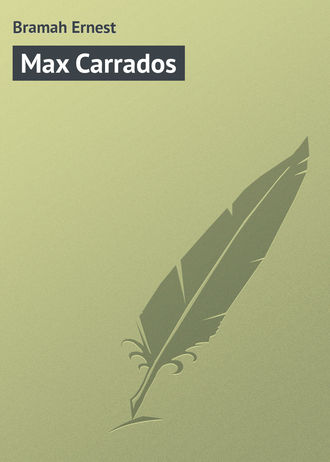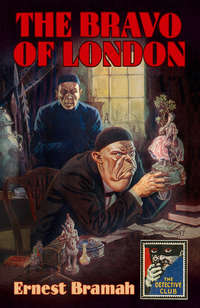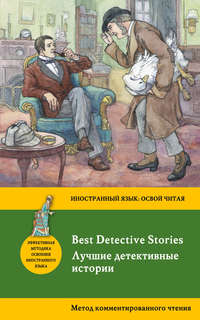 полная версия
полная версияMax Carrados
He jumped up and turned towards the door. Carlyle made a step forward, but the precaution was unnecessary.
“One moment, Mr Drishna,” interposed Carrados, in his smoothest tones. “It is a pity, after you have come so far, to leave without hearing of my investigations in the neighbourhood of Shaftesbury Avenue.”
Drishna sat down again.
“As you like,” he muttered. “It does not interest me.”
“I wanted to obtain a lamp of a certain pattern,” continued Carrados. “It seemed to me that the simplest explanation would be to say that I wanted it for a motor car. Naturally I went to Long Acre. At the first shop I said: ‘Wasn’t it here that a friend of mine, an Indian gentleman, recently had a lamp made with a green glass that was nearly five inches across?’ No, it was not there but they could make me one. At the next shop the same; at the third, and fourth, and so on. Finally my persistence was rewarded. I found the place where the lamp had been made, and at the cost of ordering another I obtained all the details I wanted. It was news to them, the shopman informed me, that in some parts of India green was the danger colour and therefore tail lamps had to show a green light. The incident made some impression on him and he would be able to identify their customer – who paid in advance and gave no address – among a thousand of his countrymen. Do I succeed in interesting you, Mr Drishna?”
“Do you?” replied Drishna, with a languid yawn. “Do I look interested?”
“You must make allowance for my unfortunate blindness,” apologized Carrados, with grim irony.
“Blindness!” exclaimed Drishna, dropping his affectation of unconcern as though electrified by the word, “do you mean – really blind – that you do not see me?”
“Alas, no,” admitted Carrados.
The Indian withdrew his right hand from his coat pocket and with a tragic gesture flung a heavy revolver down on the table between them.
“I have had you covered all the time, Mr Carrados, and if I had wished to go and you or your friend had raised a hand to stop me, it would have been at the peril of your lives,” he said, in a voice of melancholy triumph. “But what is the use of defying fate, and who successfully evades his destiny? A month ago I went to see one of our people who reads the future and sought to know the course of certain events. ‘You need fear no human eye,’ was the message given to me. Then she added: ‘But when the sightless sees the unseen, make your peace with Yama.’ And I thought she spoke of the Great Hereafter!”
“This amounts to an admission of your guilt,” exclaimed Mr Carlyle practically.
“I bow to the decree of fate,” replied Drishna. “And it is fitting to the universal irony of existence that a blind man should be the instrument. I don’t imagine, Mr Carlyle,” he added maliciously, “that you, with your eyes, would ever have brought that result about.”
“You are a very cold-blooded young scoundrel, sir!” retorted Mr Carlyle. “Good heavens! do you realize that you are responsible for the death of scores of innocent men and women?”
“Do you realise, Mr Carlyle, that you and your Government and your soldiers are responsible for the death of thousands of innocent men and women in my country every day? If England was occupied by the Germans who quartered an army and an administration with their wives and their families and all their expensive paraphernalia on the unfortunate country until the whole nation was reduced to the verge of famine, and the appointment of every new official meant the callous death sentence on a thousand men and women to pay his salary, then if you went to Berlin and wrecked a train you would be hailed a patriot. What Boadicea did and – and Samson, so have I. If they were heroes, so am I.”
“Well, upon my word!” cried the highly scandalized Carlyle, “what next! Boadicea was a – er – semi-legendary person, whom we may possibly admire at a distance. Personally, I do not profess to express an opinion. But Samson, I would remind you, is a Biblical character. Samson was mocked as an enemy. You, I do not doubt, have been entertained as a friend.”
“And haven’t I been mocked and despised and sneered at every day of my life here by your supercilious, superior, empty-headed men?” flashed back Drishna, his eyes leaping into malignity and his voice trembling with sudden passion. “Oh! how I hated them as I passed them in the street and recognized by a thousand petty insults their lordly English contempt for me as an inferior being – a nigger. How I longed with Caligula that a nation had a single neck that I might destroy it at one blow. I loathe you in your complacent hypocrisy, Mr Carlyle, despise and utterly abominate you from an eminence of superiority that you can never even understand.”
“I think we are getting rather away from the point, Mr Drishna,” interposed Carrados, with the impartiality of a judge. “Unless I am misinformed, you are not so ungallant as to include everyone you have met here in your execration?”
“Ah, no,” admitted Drishna, descending into a quite ingenuous frankness. “Much as I hate your men I love your women. How is it possible that a nation should be so divided – its men so dull-witted and offensive, its women so quick, sympathetic and capable of appreciating?”
“But a little expensive, too, at times?” suggested Carrados.
Drishna sighed heavily.
“Yes; it is incredible. It is the generosity of their large nature. My allowance, though what most of you would call noble, has proved quite inadequate. I was compelled to borrow money and the interest became overwhelming. Bankruptcy was impracticable because I should have then been recalled by my people, and much as I detest England a certain reason made the thought of leaving it unbearable.”
“Connected with the Arcady Theatre?”
“You know? Well, do not let us introduce the lady’s name. In order to restore myself I speculated on the Stock Exchange. My credit was good through my father’s position and the standing of the firm to which I am attached. I heard on reliable authority, and very early, that the Central and Suburban, and the Deferred especially, was safe to fall heavily, through a motor bus amalgamation that was then a secret. I opened a bear account and sold largely. The shares fell, but only fractionally, and I waited. Then, unfortunately, they began to go up. Adverse forces were at work and rumours were put about. I could not stand the settlement, and in order to carry over an account I was literally compelled to deal temporarily with some securities that were not technically my own property.”
“Embezzlement, sir,” commented Mr Carlyle icily. “But what is embezzlement on the top of wholesale murder!”
“That is what it is called. In my case, however, it was only to be temporary. Unfortunately, the rise continued. Then, at the height of my despair, I chanced to be returning to Swanstead rather earlier than usual one evening, and the train was stopped at a certain signal to let another pass. There was conversation in the carriage and I learned certain details. One said that there would be an accident some day, and so forth. In a flash – as by an inspiration – I saw how the circumstance might be turned to account. A bad accident and the shares would certainly fall and my position would be retrieved. I think Mr Carrados has somehow learned the rest.”
“Max,” said Mr Carlyle, with emotion, “is there any reason why you should not send your man for a police officer and have this monster arrested on his own confession without further delay?”
“Pray do so, Mr Carrados,” acquiesced Drishna. “I shall certainly be hanged, but the speech I shall prepare will ring from one end of India to the other; my memory will be venerated as that of a martyr; and the emancipation of my motherland will be hastened by my sacrifice.”
“In other words,” commented Carrados, “there will be disturbances at half-a-dozen disaffected places, a few unfortunate police will be clubbed to death, and possibly worse things may happen. That does not suit us, Mr Drishna.”
“And how do you propose to prevent it?” asked Drishna, with cool assurance.
“It is very unpleasant being hanged on a dark winter morning; very cold, very friendless, very inhuman. The long trial, the solitude and the confinement, the thoughts of the long sleepless night before, the hangman and the pinioning and the noosing of the rope, are apt to prey on the imagination. Only a very stupid man can take hanging easily.”
“What do you want me to do instead, Mr Carrados?” asked Drishna shrewdly.
Carrados’s hand closed on the weapon that still lay on the table between them. Without a word he pushed it across.
“I see,” commented Drishna, with a short laugh and a gleaming eye. “Shoot myself and hush it up to suit your purpose. Withhold my message to save the exposures of a trial, and keep the flame from the torch of insurrectionary freedom.”
“Also,” interposed Carrados mildly, “to save your worthy people a good deal of shame, and to save the lady who is nameless the unpleasant necessity of relinquishing the house and the income which you have just settled on her. She certainly would not then venerate your memory.”
“What is that?”
“The transaction which you carried through was based on a felony and could not be upheld. The firm you dealt with will go to the courts, and the money, being directly traceable, will be held forfeit as no good consideration passed.”
“Max!” cried Mr Carlyle hotly, “you are not going to let this scoundrel cheat the gallows after all?”
“The best use you can make of the gallows is to cheat it, Louis,” replied Carrados. “Have you ever reflected what human beings will think of us a hundred years hence?”
“Oh, of course I’m not really in favour of hanging,” admitted Mr Carlyle.
“Nobody really is. But we go on hanging. Mr Drishna is a dangerous animal who for the sake of pacific animals must cease to exist. Let his barbarous exploit pass into oblivion with him. The disadvantages of spreading it broadcast immeasurably outweigh the benefits.”
“I have considered,” announced Drishna. “I will do as you wish.”
“Very well,” said Carrados. “Here is some plain notepaper. You had better write a letter to someone saying that the financial difficulties in which you are involved make life unbearable.”
“But there are no financial difficulties – now.”
“That does not matter in the least. It will be put down to an hallucination and taken as showing the state of your mind.”
“But what guarantee have we that he will not escape?” whispered Mr Carlyle.
“He cannot escape,” replied Carrados tranquilly. “His identity is too clear.”
“I have no intention of trying to escape,” put in Drishna, as he wrote. “You hardly imagine that I have not considered this eventuality, do you?”
“All the same,” murmured the ex-lawyer, “I should like to have a jury behind me. It is one thing to execute a man morally; it is another to do it almost literally.”
“Is that all right?” asked Drishna, passing across the letter he had written.
Carrados smiled at this tribute to his perception.
“Quite excellent,” he replied courteously. “There is a train at nine-forty. Will that suit you?”
Drishna nodded and stood up. Mr Carlyle had a very uneasy feeling that he ought to do something but could not suggest to himself what.
The next moment he heard his friend heartily thanking the visitor for the assistance he had been in the matter of the Indo-Scythian inscription, as they walked across the hall together. Then a door closed.
“I believe that there is something positively uncanny about Max at times,” murmured the perturbed gentleman to himself.
THE TRAGEDY AT BROOKBEND COTTAGE
“Max,” said Mr Carlyle, when Parkinson had closed the door behind him, “this is Lieutenant Hollyer, whom you consented to see.”
“To hear,” corrected Carrados, smiling straight into the healthy and rather embarrassed face of the stranger before him. “Mr Hollyer knows of my disability?”
“Mr Carlyle told me,” said the young man, “but, as a matter of fact, I had heard of you before, Mr Carrados, from one of our men. It was in connexion with the foundering of the Ivan Saratov.”
Carrados wagged his head in good-humoured resignation.
“And the owners were sworn to inviolable secrecy!” he exclaimed. “Well, it is inevitable, I suppose. Not another scuttling case, Mr Hollyer?”
“No, mine is quite a private matter,” replied the lieutenant. “My sister, Mrs Creake – but Mr Carlyle would tell you better than I can. He knows all about it.”
“No, no; Carlyle is a professional. Let me have it in the rough, Mr Hollyer. My ears are my eyes, you know.”
“Very well, sir. I can tell you what there is to tell, right enough, but I feel that when all’s said and done it must sound very little to another, although it seems important enough to me.”
“We have occasionally found trifles of significance ourselves,” said Carrados encouragingly. “Don’t let that deter you.”
This was the essence of Lieutenant Hollyer’s narrative:
“I have a sister, Millicent, who is married to a man called Creake. She is about twenty-eight now and he is at least fifteen years older. Neither my mother (who has since died), nor I, cared very much about Creake. We had nothing particular against him, except, perhaps, the moderate disparity of age, but none of us appeared to have anything in common. He was a dark, taciturn man, and his moody silence froze up conversation. As a result, of course, we didn’t see much of each other.”
“This, you must understand, was four or five years ago, Max,” interposed Mr Carlyle officiously.
Carrados maintained an uncompromising silence. Mr Carlyle blew his nose and contrived to impart a hurt significance into the operation. Then Lieutenant Hollyer continued:
“Millicent married Creake after a very short engagement. It was a frightfully subdued wedding – more like a funeral to me. The man professed to have no relations and apparently he had scarcely any friends or business acquaintances. He was an agent for something or other and had an office off Holborn. I suppose he made a living out of it then, although we knew practically nothing of his private affairs, but I gather that it has been going down since, and I suspect that for the past few years they have been getting along almost entirely on Millicent’s little income. You would like the particulars of that?”
“Please,” assented Carrados.
“When our father died about seven years ago, he left three thousand pounds. It was invested in Canadian stock and brought in a little over a hundred a year. By his will my mother was to have the income of that for life and on her death it was to pass to Millicent, subject to the payment of a lump sum of five hundred pounds to me. But my father privately suggested to me that if I should have no particular use for the money at the time, he would propose my letting Millicent have the income of it until I did want it, as she would not be particularly well off. You see, Mr Carrados, a great deal more had been spent on my education and advancement than on her; I had my pay, and, of course, I could look out for myself better than a girl could.”
“Quite so,” agreed Carrados.
“Therefore I did nothing about that,” continued the lieutenant. “Three years ago I was over again but I did not see much of them. They were living in lodgings. That was the only time since the marriage that I have seen them until last week. In the meanwhile our mother had died and Millicent had been receiving her income. She wrote me several letters at the time. Otherwise we did not correspond much, but about a year ago she sent me their new address – Brookbend Cottage, Mulling Common – a house that they had taken. When I got two months’ leave I invited myself there as a matter of course, fully expecting to stay most of my time with them, but I made an excuse to get away after a week. The place was dismal and unendurable, the whole life and atmosphere indescribably depressing.” He looked round with an instinct of caution, leaned forward earnestly, and dropped his voice. “Mr Carrados, it is my absolute conviction that Creake is only waiting for a favourable opportunity to murder Millicent.”
“Go on,” said Carrados quietly. “A week of the depressing surroundings of Brookbend Cottage would not alone convince you of that, Mr Hollyer.”
“I am not so sure,” declared Hollyer doubtfully. “There was a feeling of suspicion and – before me – polite hatred that would have gone a good way towards it. All the same there was something more definite. Millicent told me this the day after I went there. There is no doubt that a few months ago Creake deliberately planned to poison her with some weed-killer. She told me the circumstances in a rather distressed moment, but afterwards she refused to speak of it again – even weakly denied it – and, as a matter of fact, it was with the greatest difficulty that I could get her at any time to talk about her husband or his affairs. The gist of it was that she had the strongest suspicion that Creake doctored a bottle of stout which he expected she would drink for her supper when she was alone. The weed-killer, properly labelled, but also in a beer bottle, was kept with other miscellaneous liquids in the same cupboard as the beer but on a high shelf. When he found that it had miscarried he poured away the mixture, washed out the bottle and put in the dregs from another. There is no doubt in my mind that if he had come back and found Millicent dead or dying he would have contrived it to appear that she had made a mistake in the dark and drunk some of the poison before she found out.”
“Yes,” assented Carrados. “The open way; the safe way.”
“You must understand that they live in a very small style, Mr Carrados, and Millicent is almost entirely in the man’s power. The only servant they have is a woman who comes in for a few hours every day. The house is lonely and secluded. Creake is sometimes away for days and nights at a time, and Millicent, either through pride or indifference, seems to have dropped off all her old friends and to have made no others. He might poison her, bury the body in the garden, and be a thousand miles away before anyone began even to inquire about her. What am I to do, Mr Carrados?”
“He is less likely to try poison than some other means now,” pondered Carrados. “That having failed, his wife will always be on her guard. He may know, or at least suspect, that others know. No… The common-sense precaution would be for your sister to leave the man, Mr Hollyer. She will not?”
“No,” admitted Hollyer, “she will not. I at once urged that.” The young man struggled with some hesitation for a moment and then blurted out: “The fact is, Mr Carrados, I don’t understand Millicent. She is not the girl she was. She hates Creake and treats him with a silent contempt that eats into their lives like acid, and yet she is so jealous of him that she will let nothing short of death part them. It is a horrible life they lead. I stood it for a week and I must say, much as I dislike my brother-in-law, that he has something to put up with. If only he got into a passion like a man and killed her it wouldn’t be altogether incomprehensible.”
“That does not concern us,” said Carrados. “In a game of this kind one has to take sides and we have taken ours. It remains for us to see that our side wins. You mentioned jealousy, Mr Hollyer. Have you any idea whether Mrs Creake has real ground for it?”
“I should have told you that,” replied Lieutenant Hollyer. “I happened to strike up with a newspaper man whose office is in the same block as Creake’s. When I mentioned the name he grinned. ‘Creake,’ he said, ‘oh, he’s the man with the romantic typist, isn’t he?’ ‘Well, he’s my brother-in-law,’ I replied. ‘What about the typist?’ Then the chap shut up like a knife. ‘No, no,’ he said, ‘I didn’t know he was married. I don’t want to get mixed up in anything of that sort. I only said that he had a typist. Well, what of that? So have we; so has everyone.’ There was nothing more to be got out of him, but the remark and the grin meant – well, about as usual, Mr Carrados.”
Carrados turned to his friend.
“I suppose you know all about the typist by now, Louis?”
“We have had her under efficient observation, Max,” replied Mr Carlyle, with severe dignity.
“Is she unmarried?”
“Yes; so far as ordinary repute goes, she is.”
“That is all that is essential for the moment. Mr Hollyer opens up three excellent reasons why this man might wish to dispose of his wife. If we accept the suggestion of poisoning – though we have only a jealous woman’s suspicion for it – we add to the wish the determination. Well, we will go forward on that. Have you got a photograph of Mr Creake?”
The lieutenant took out his pocket-book.
“Mr Carlyle asked me for one. Here is the best I could get.”
Carrados rang the bell.
“This, Parkinson,” he said, when the man appeared, “is a photograph of a Mr – What first name, by the way?”
“Austin,” put in Hollyer, who was following everything with a boyish mixture of excitement and subdued importance.
“ – of a Mr Austin Creake. I may require you to recognize him.”
Parkinson glanced at the print and returned it to his master’s hand.
“May I inquire if it is a recent photograph of the gentleman, sir?” he asked.
“About six years ago,” said the lieutenant, taking in this new actor in the drama with frank curiosity. “But he is very little changed.”
“Thank you, sir. I will endeavour to remember Mr Creake, sir.”
Lieutenant Hollyer stood up as Parkinson left the room. The interview seemed to be at an end.
“Oh, there’s one other matter,” he remarked. “I am afraid that I did rather an unfortunate thing while I was at Brookbend. It seemed to me that as all Millicent’s money would probably pass into Creake’s hands sooner or later I might as well have my five hundred pounds, if only to help her with afterwards. So I broached the subject and said that I should like to have it now as I had an opportunity for investing.”
“And you think?”
“It may possibly influence Creake to act sooner than he otherwise might have done. He may have got possession of the principal even and find it very awkward to replace it.”
“So much the better. If your sister is going to be murdered it may as well be done next week as next year so far as I am concerned. Excuse my brutality, Mr Hollyer, but this is simply a case to me and I regard it strategically. Now Mr Carlyle’s organization can look after Mrs Creake for a few weeks but it cannot look after her for ever. By increasing the immediate risk we diminish the permanent risk.”
“I see,” agreed Hollyer. “I’m awfully uneasy but I’m entirely in your hands.”
“Then we will give Mr Creake every inducement and every opportunity to get to work. Where are you staying now?”
“Just now with some friends at St Albans.”
“That is too far.” The inscrutable eyes retained their tranquil depth but a new quality of quickening interest in the voice made Mr Carlyle forget the weight and burden of his ruffled dignity. “Give me a few minutes, please. The cigarettes are behind you, Mr Hollyer.” The blind man walked to the window and seemed to look out over the cypress-shaded lawn. The lieutenant lit a cigarette and Mr Carlyle picked up Punch. Then Carrados turned round again.
“You are prepared to put your own arrangements aside?” he demanded of his visitor.
“Certainly.”
“Very well. I want you to go down now – straight from here – to Brookbend Cottage. Tell your sister that your leave is unexpectedly cut short and that you sail to-morrow.”
“The Martian?”
“No, no; the Martian doesn’t sail. Look up the movements on your way there and pick out a boat that does. Say you are transferred. Add that you expect to be away only two or three months and that you really want the five hundred pounds by the time of your return. Don’t stay in the house long, please.”
“I understand, sir.”
“St Albans is too far. Make your excuse and get away from there to-day. Put up somewhere in town, where you will be in reach of the telephone. Let Mr Carlyle and myself know where you are. Keep out of Creake’s way. I don’t want actually to tie you down to the house, but we may require your services. We will let you know at the first sign of anything doing and if there is nothing to be done we must release you.”
“I don’t mind that. Is there nothing more that I can do now?”





